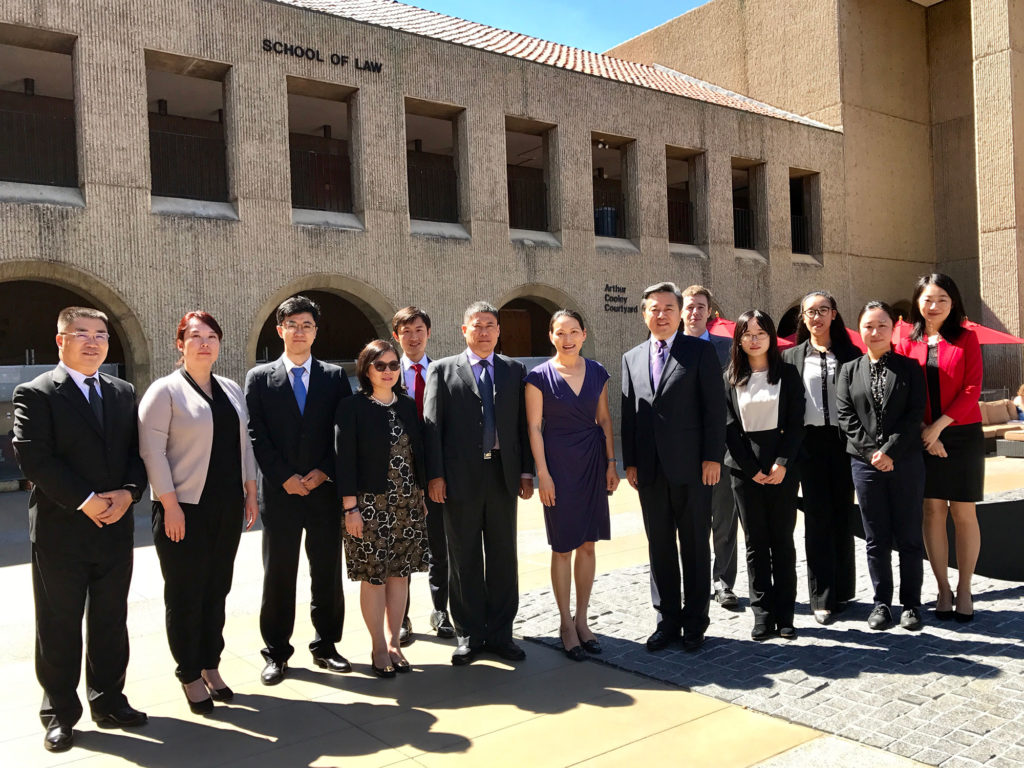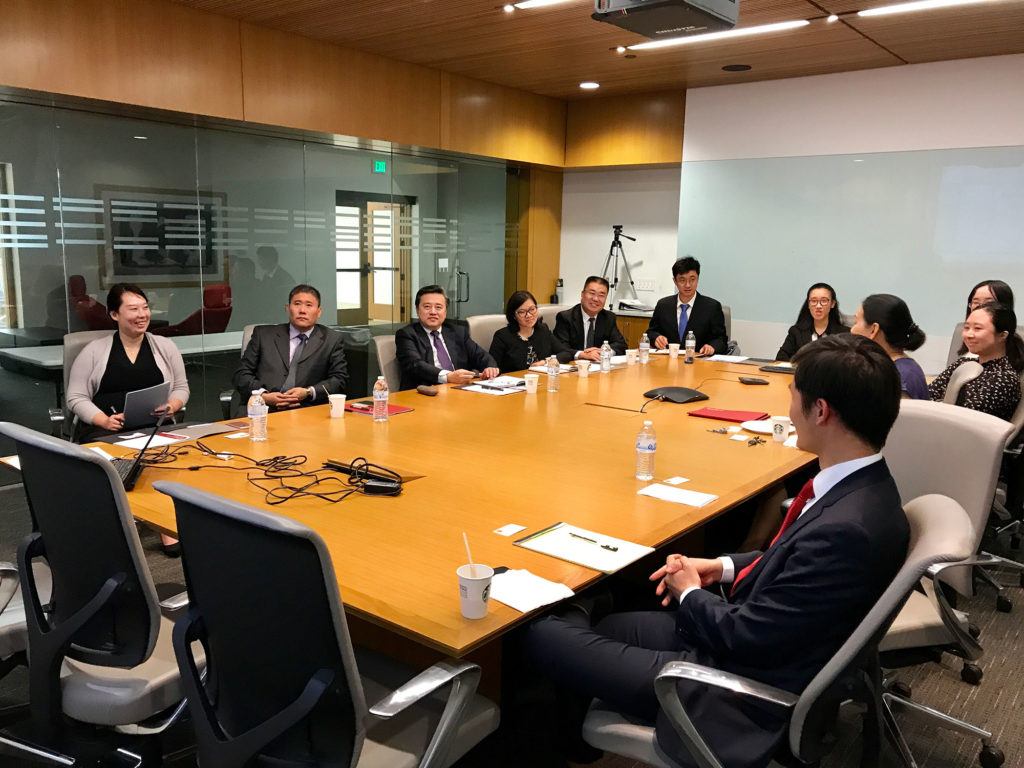RSVP NOW for Seminar on China’s IP Case System Featuring Beijing IP Court Judges; Successful Meeting with Supreme People’s Court Delegation; Final Call for Writing Contest (NEW Deadline: October 10, 2017)

Upcoming Seminar on China’s IP Case System Featuring Judges from the Beijing IP Court
Seven years after China established its system of Guiding Cases (i.e., de facto binding precedents), the country is ready to take another groundbreaking step: building a case system that focuses on intellectual property. Will this system be more in line with stare decisis, with judgments rendered by China’s IP courts considered formally binding? Will the database being built to support this new system be open to the public to promote understanding and facilitate legal practice? How might foreign parties, including U.S. businesses and innovators, be able to leverage this new development to better protect their legal rights and interests?
To answer the above and related questions, Dr. Mei Gechlik, Founder and Director of the China Guiding Cases Project (“CGCP”), will moderate a Guiding Cases SeminarTMon October 19, 2017 at Stanford Law School (“SLS”) featuring Judge JIANG Shuwei and Judge LIU Yijun (both judges from the Beijing IP Court), Judge William A. Fletcher (Circuit Judge, Court of Appeals for the Ninth Circuit), Mr. John Liu (Chief Technology Officer, Gridsum Holding Inc.), and Professor Leon Lee (Executive Director, Case Law Research Center, School of Law, Central University of Finance and Economics). SLS Dean Elizabeth Magill will deliver an opening speech to welcome the speakers and guests. Don’t miss the chance to learn about this significant development in the Chinese legal system and RSVP here today!
The CGCP thanks Professor Leon Lee of the School of Law of Central University of Finance and Economics (“CUFE”) for bringing us this opportunity to host such an important event. Judge GUO Feng (Supreme People’s Court of China), who oversees China’s Guiding Cases System, previously served as the dean of CUFE’s law school. Under his deanship, the school developed a strong emphasis on using the case study method, culminating in the establishment of the Case Law Research Center. The center has been working closely with the Supreme People’s Court of China to help promote the use of cases nationwide.
In addition to the above seminar, Judge LIU Yijun will also join a panel at the Patent Law in Global Perspective conference to discuss with other panelists global patent licensing and enforcement.
Successful Meeting with Supreme People’s Court of China Delegation

China’s establishment of an IP case system is part of the country’s goal of using representative, well-reasoned cases to guide adjudication and other dispute resolution processes. This goal was emphasized during a meeting held at SLS on September 24, 2017 with Dr. Mei Gechlik and six CGCP members along with a Chinese delegation led by Judge QIAN Xiaochen, President of the Research Institute of Judicial Cases and Deputy Director-General of the Information Center, Supreme People’s Court. According to Judge Qian, the Supreme People’s Court has been developing a platform (http://anli.court.gov.cn) where representative, well-reasoned cases recommended by legal experts and other interested parties are available. This platform serves as a supplement to another website of the Supreme People’s Court (http://wenshu.court.gov.cn), which houses all judgments or rulings of Chinese courts, unless they are withheld for privacy or other reasons. Currently, the http://wenshu.court.gov.cn website has more than 35 million judgments/rulings, while the judgments/rulings of nearly 40,000 representative, well-reasoned cases are available at http://anli.court.gov.cn/.
The two sides exchanged other thoughts about how to develop strong databases to help China’s legal culture expand to include the use of cases. The CGCP thanks the U.S. Department of State and U.S. Embassy in China for arranging this high-level visit.
Final Call for Writing Contest (NEW Deadline: October 10, 2017)
Due to numerous requests, we have decided to extend the deadline to October 10.
In May 2017, we launched an international Writing Contest to encourage more analyses of cases in China because of their growing importance. We have received many submissions. Thank you. With the contest closing in just a few short days, we look forward to reading the submissions and announcing the winners. If you are planning to apply but have not yet done so, don’t forget to email your submission to contactcgcp@law.stanford.edu by Tuesday, October 10! For more information about the Writing Contest, including all of the requirements for a complete submission, please visit https://cgc.law.stanford.edu/event/china-cases-insights-writing-contest-2017.
For published China Cases InsightsTM, please see China Cases Insight No. 1: “In Qihu v. Tencent, the Chinese Supreme People’s Court Offers Antitrust Insight for the Digital Age” by the Honorable John M. Walker, Jr. (Senior Circuit Judge, U.S. Court of Appeals for the Second Circuit) (link) and China Cases Insight No. 2: “Guiding Case No. 70: Food and Chinese Medicine” by Dr. Gechlik and Zhaoyi (Troy) Song (Assistant Managing Editor, CGCP).
The CGCP thanks our sponsors, including Alston & Bird LLP, Broad & Bright, the Center for East Asian Studies of Stanford University, China Fund of the Freeman Spogli Institute for International Studies of Stanford University, and the Fu Tak Iam Foundation Limited, for their kind and generous support. The CGCP strives to continue bringing you more insights about China’s Guiding Cases. Please help us achieve this goal by making a gift to us today and become part of our historic mission to help China develop its case law system. Thank you for your support!
Post Pagination
- Previous Article Training China Law Society Delegates on Guiding Cases and Belt & Road Initiative; Ten New B&R Cases; Hoover Paper on US-China Cyber Relations; Writing Contest (Great Progress)
- Next Article Judicial Reforms Propelled by China’s Belt & Road Initiative; October Seminar on China’s New IP Case System Featuring Chinese and U.S. Judges
